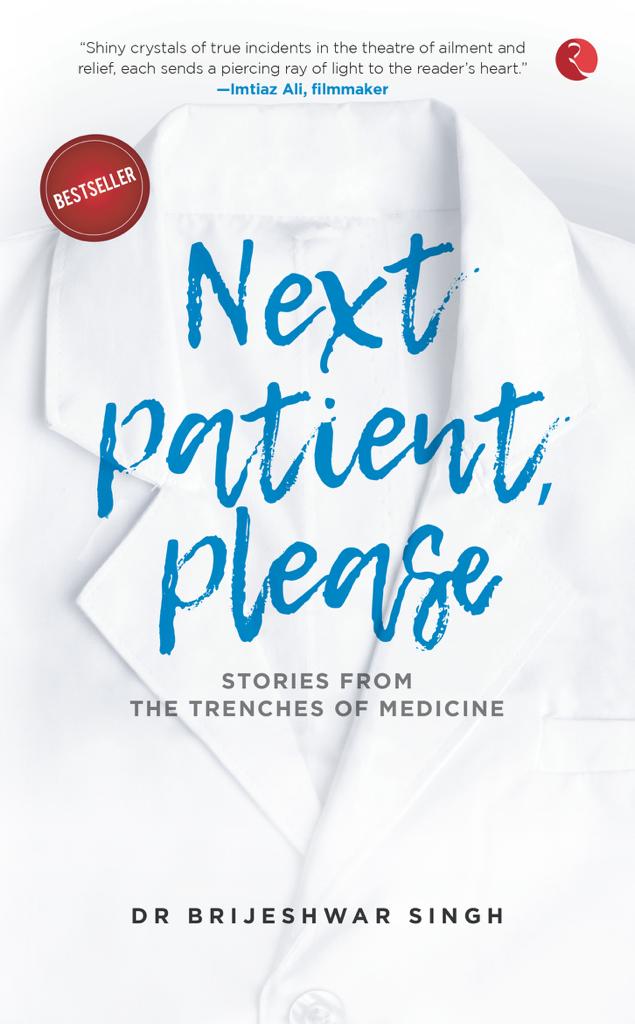
Book Review: Next Patient, Please
Brijeshwar puts poetry as preface to prose
A lot has been written about Brijeshwar Singh’s Bestseller ‘Next Patient, Please’. There’s no doubt about the fact that all the 38 stories in the book introduce us to different dimensions of pain, sorrow, hope and happiness. For me, one of the most important elements of the book is that its narrative is more than just uncomplicated. It is actually simple, and that’s what I like about it. But there’s another interesting aspect that has probably gone unnoticed so far, and that is the poems Brijeshwar has put before some of the stories in the book. The arrangement of the poems as prelude to the stories is not merely an experiment, but a brave move by the author. Here’s how!
Not many people know Brijeshwar as a poet. That’s probably because his prose is more talked and written about. His first book ‘In & Out of Theatre’ (2014) was all prose. Then he went on to write his first play ‘Paladin’ which was based on Paul Kalanithi’s book ‘When Breath Becomes Air’. Although there was no apparent use of poetry in the script, the play had an undertone of philosophy that stopped right on the verge of poetry, and therefore, the overall texture of ‘Paladin’ gave the audience a mixed hint of poetry and philosophy. But the story doesn’t end there. Brijeshwar has been writing poems in Hindi for quite some time now. Some of his work has also been transformed into beautiful audio-visuals by prominent artists including Varsha Singh Dhanoa and Rajendra Gupta. Brijeshwar also used some of his poems in ‘Zindagi Zara Si Hai’ which happens to be his second work as a playwright.
Coming back to ‘Next Patient, Please’, we find that the foreword is written by a highly respected and celebrated Urdu poet of our times, Waseem Barelvi. He opens his piece with a classic couplet from none other than the great Jigar Moradabadi:
Allah agar taufeeq na de
Insaan ke bas ka kaaam nahi
(It’s not up to us humans, if it isn’t willed by God)
Waseem goes on to describe the book “pithily” with one of his own couplets:
Ajeeb dard ka rishta dikhaayi deta hai
Ke har gham-aashna apna dikhaayi deta hai
(What is this strange bond of pain I see around me?
Everyone who knows misery, I see as my own)
Waseem Barelvi’s foreword sets the tone right for the book. The reader (in her subconscious) is ready for stories that are not merely a download of information about a highly traumatic and dramatic scene from a hospital. And then, Brijeshwar introduces one character after the other. As we dive deep into the book, we come across the poet Brijeshwar. Each short poem gives a hint of what to expect from the story. But the most beautiful thing about these poems is that they are not just supplementary to the stories but each of them is a complete piece of art per se. From unending sorrow to the grit and resolution of winning against all odds, from the darkest dungeons of crime to the most innocent moments of childhood, and from the alleys of hopelessness to the brightest shining rays of hope, these poems talk about different shades of life in the most honest and simple words. Here’s the one Brijeshwar has put before the story titled ‘No Place like Home’:
Where the children all play with dolls of clay,
Where the lemonade comes, served on an old tray,
Where humble smiles are thrown your way,
Where mothers meet, over a pattern of crochet,
Let me brag, if I may,
Nothing compares to where I stay.
While the poem doesn’t directly talk about the characters of the story it preludes, it gives us a fair idea about the genre Brijeshwar wants to explore and unfold in the next few pages. The technique is certainly a subtle evolution from his first book ‘In & Out Theatres’, and it has the potential of putting ‘Next Patient, Please’ on the verge of creating a new genre in storytelling. It also makes one wonder if Brijeshwar is going to delve deeper into poetry in his upcoming pieces of work. Eh, Doc?
